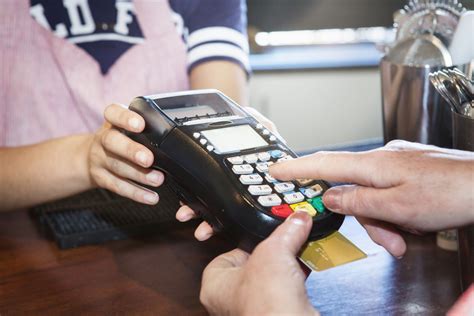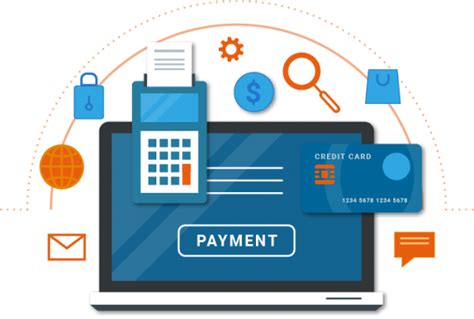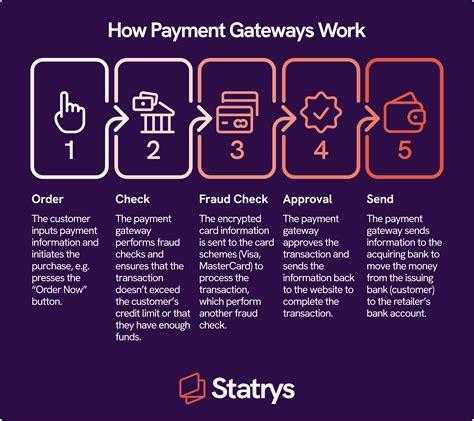- Understanding the Basics of Credit Card Payment Acceptance for Contractors
- Choosing the Right Payment Processor: Factors to Consider
- Steps to Set Up Credit Card Payment Acceptance for Your Contracting Business
- Step 1: Choose a Payment Processor
- Step 2: Create a Merchant Account
- Step 3: Set Up a Payment Gateway
- Step 4: Test Your Payment System
- Step 5: Promote Your New Payment System
- Ensuring Security and Compliance with Credit Card Payment Acceptance
- Maximizing the Benefits of Accepting Credit Card Payments as a Contractor
- 1. Get Paid Faster
- 2. Increase Sales and Revenue
- 3. Improve Customer Satisfaction
- 4. Streamline Your Bookkeeping
- 5. Protect Yourself From Fraud
Understanding the Basics of Credit Card Payment Acceptance for Contractors
As a contractor, it’s crucial to be able to accept credit card payments from clients, as this provides added convenience for your customers, and also helps increase your business revenue. However, if you’re new to the concept of credit card payment acceptance, it can seem challenging to get started. In this article, we’ll break down the basics of credit card payment acceptance for contractors, so you can begin taking payments and growing your business.
The first step in understanding credit card payment acceptance is to understand the different types of credit card transactions. These include Card Present (CP), Card Not Present (CNP), recurring payments, and mobile payments. Card Present transactions are when the cardholder presents their credit card for an in-person transaction, such as at a storefront or office. Card Not Present transactions occur when the card is not physically present, such as with online or over-the-phone purchases. Recurring payments occur when a customer authorizes a business to automatically charge their card on a regular basis, such as for a subscription service. Mobile payments refer to transactions made through a mobile device, such as a phone or tablet.
Once you understand the different types of transactions, the next step is to choose a payment processor. A payment processor is a third-party company that facilitates credit card transactions between merchants (you as a contractor) and customers. Payment processors charge a small fee for their services, usually a percentage of the transaction value, so it’s essential to choose a processor with competitive rates. Some popular payment processors for contractors include PayPal, Square, and Stripe. Research each provider before making a decision to ensure they offer the services you need.
Before you can begin accepting credit card payments, you’ll need to set up a merchant account. A merchant account is a type of bank account that allows businesses to accept credit card payments. You’ll need to provide some basic information, such as your business name, address, and tax ID number, to set up the account. Your payment processor will guide you through this process, so don’t worry if you’re not sure where to begin. Some providers may offer an all-in-one solution, combining the payment processor and merchant account.
Now that you have set up a payment processor and merchant account, you’ll need to decide how you will accept credit card payments. This can include in-person terminals, online shopping carts, virtual terminals, and mobile card readers. In-person terminals are physical devices that businesses can use to swipe credit cards in person. Online shopping carts are an e-commerce solution that allows clients to purchase services directly from your website. Virtual terminals are an online platform that allows you to manually input customers’ credit card information. Mobile card readers are devices that connect to your mobile device to accept credit card payments on the go. Consider which options best suit your business needs and include them on your website as well as printing out details for in-person transactions.
Finally, it’s vital to keep your customers’ personal and financial information secure when accepting credit card payments. Ensure your website is secure with an SSL certificate and adhere to Payment Card Industry Data Security Standards (PCI DSS) when handling customer payment information. Always verify transaction details before processing them and use your payment processor’s fraud detection and prevention tools to prevent unwanted transactions. You want to provide the utmost security that way your customers can trust the security of your receipts and payments system.
By following these basic steps, any contractor can begin accepting credit card payments from clients. Providing this added convenience to your customers can help grow your business and increase revenue, making it an essential component of any modern contractor’s payment options. Remember to choose a payment processor with competitive rates, set up a merchant account, decide how you’ll accept payments, and keep customer information secure.
Choosing the Right Payment Processor: Factors to Consider
When you are a contractor, getting paid on time and regularly is essential to sustaining your business. In today’s digital age, offering your clients the option to pay using credit cards can help you achieve that goal more efficiently and reliably. However, choosing the right payment processor can be a daunting task, especially if you are not familiar with what to look for. Here are some of the critical factors to consider when choosing a payment processor for your contractor business:
Fees and Costs
Cost is one of the most important factors you should consider when selecting a payment processor. Each processor has its pricing model and fee structure, so you will want to compare and contrast various options to determine which one offers the best value for your business. Some processors charge flat fees while others charge a percentage of every transaction. Additionally, some providers may charge you for monthly statements, payments processed, or insufficient funds, so be sure to read the fine print carefully.
Payment Types
The payment types that a processor accepts can be a crucial factor in determining whether or not they are the right fit for your business. Some providers only accept credit or debit card payments, while others accept eChecks and other payment methods. If you want to offer your clients more flexibility in how they pay, choose a provider that accepts a broad range of payment types.
Security
Security is paramount when handling sensitive financial information, particularly with the risk of data breaches and other cyber threats rising every day. Therefore, choose a payment processor that complies with the highest industry standards for security, such as being PCI (Payment Card Industry) compliant. Additionally, look for processors that offer fraud detection and prevention features, such as encryption and tokenization.
Customer Support
When you have questions or concerns about your payment processing, you want to be able to reach someone who can help you promptly. Before settling on a payment processor, research their customer support channels and read reviews from other users to determine if they have what it takes to meet your needs. Look for a provider that offers 24/7 customer service, preferably with a live chat or phone option.
Integrations
If you are already using other software and tools to run your contractor business, such as invoicing software, you want to ensure that your payment processor seamlessly integrates with them. Choose a processor that offers integrations with your existing tools or offers an API (Application Programming Interface) to enable custom integrations. This way, you can avoid manual data entry and save time on administrative tasks.
Choosing the right payment processor for your contractor business can be a game-changer in terms of simplifying your payment collection processes and ensuring you get paid on time. By considering the factors outlined here, you can make an informed decision that suits your business’s unique needs.
Steps to Set Up Credit Card Payment Acceptance for Your Contracting Business

As a contractor, accepting credit card payments is a no-brainer. It is convenient for both you and your clients, reduces the risk of fraud, and improves the efficiency of your business transactions. But setting up credit card payment acceptance for your contracting business can be a daunting task, especially if you are new to the concept. Here are some steps to help you set up credit card payment acceptance for your contracting business.
Step 1: Choose a Payment Processor

The first step in setting up credit card payment acceptance for your contracting business is to choose a payment processor. A payment processor is a company that handles credit card transactions on your behalf. They will receive and process payments from your clients and deposit the funds into your business account. Payment processors charge fees for their services, so it is important to choose one that fits your budget and offers the services you need.
Step 2: Create a Merchant Account

Once you have chosen a payment processor, you will need to create a merchant account. A merchant account is a type of bank account that allows you to accept credit card payments. The payment processor will guide you through the process of setting up a merchant account, which may include providing information about your business, such as your Tax ID/EIN number, business address, and phone number.
Step 3: Set Up a Payment Gateway

After creating a merchant account, the next step is to set up a payment gateway. A payment gateway is a secure portal that allows your clients to enter their credit card information when making payments. The payment gateway will encrypt the credit card information and send it to the payment processor for processing. The payment processor will then deposit the funds into your merchant account.
Setting up a payment gateway involves integrating the payment processor’s software into your website or mobile app. If you don’t have a website or mobile app, the payment processor may offer a virtual terminal that you can use to process payments over the phone or through email.
Make sure your payment gateway is secure and reliable. Look for payment processors that are PCI compliant, meaning they adhere to the Payment Card Industry Data Security Standard and have measures in place to protect your clients’ credit card information.
Step 4: Test Your Payment System
![]()
Before launching your credit card payment system, it’s important to test it thoroughly. Make sure your payment gateway is integrated correctly, and that your payment processor is receiving and processing payments correctly. Test your system with small transactions to ensure it is working properly and to identify and fix any issues that may arise.
Testing your payment system will give you peace of mind knowing that your clients’ credit card information is secure and that your payments are being processed without any hiccups. It will also help you avoid any negative feedback or reviews from clients due to payment processing issues.
Step 5: Promote Your New Payment System

Now that you have set up credit card payment acceptance for your contracting business, it’s time to let your clients know. Promote your new payment system through your website, social media, and marketing materials. Let your clients know that they can now conveniently pay for your services using their credit card. Highlight the benefits of paying with a credit card, such as faster processing times, better security, and rewards points.
Consider offering special promotions or discounts to clients who pay with their credit card. This will encourage more clients to use your credit card payment system, thereby increasing your revenue and boosting your bottom line.
In conclusion, accepting credit card payments as a contractor is an essential part of running a modern and efficient business. By following these steps, you can easily set up credit card payment acceptance for your contracting business. Choose a payment processor that fits your needs and budget, create a merchant account, set up a payment gateway, test your payment system, and promote your new payment system to your clients. By implementing these steps, you can stay ahead of the competition and provide your clients with the convenience and security they deserve.
Ensuring Security and Compliance with Credit Card Payment Acceptance
As a contractor, accepting credit card payments can be a convenient and efficient way to receive payment from your clients. However, it is important to ensure that your payment processing system is secure and compliant with industry regulations to protect both you and your clients. Here are some tips to help you ensure security and compliance with credit card payment acceptance:
Choose a Reliable Payment Processor
Choosing a reliable payment processor is crucial to ensuring the security and compliance of your transactions. Look for a processor that is PCI compliant, which means they follow the security standards set by the Payment Card Industry. It’s also important to choose a processor that offers fraud protection and encryption to keep your clients’ information safe.
Use Secure Payment Methods
When accepting credit card payments, it’s important to use secure payment methods that protect your clients’ information. Consider using a secure payment gateway, which is a secure portal that connects your website to your payment processor. This ensures that the payment information is encrypted and kept secure. You can also consider using digital wallets, such as Apple Pay or Google Wallet, which offer an additional layer of security by encrypting your clients’ payment information.
Protect Your Clients’ Information
Protecting your clients’ information is crucial to maintaining their trust and complying with industry regulations. Be sure to only collect the information that you need to process the payment, and do not store any sensitive information, such as CVV codes or expiration dates. It’s also important to ensure that any data you do collect is stored securely and in compliance with industry standards.
Stay Up-to-Date on Industry Regulations
Industry regulations surrounding credit card payments are constantly changing, so it’s important to stay up-to-date on any changes that may affect your business. Ensuring that you are following the latest regulations will not only protect you from potential legal repercussions, but it will also protect your clients’ information and maintain their trust in your business.
Train Your Staff on Security Protocols
Finally, it’s important to train your staff on security protocols to ensure that everyone in your business is taking the necessary steps to maintain the security and compliance of your payment processing system. This includes training them on how to securely handle payment information and how to identify and prevent potential fraud.
By taking these steps to ensure security and compliance with credit card payment acceptance, you can protect both yourself and your clients, and maintain their trust in your business.
Maximizing the Benefits of Accepting Credit Card Payments as a Contractor
As a contractor, accepting credit card payments can be a game-changer for your business. Not only does it offer your customers a convenient way to pay, but it also unlocks a range of benefits for you as the service provider. Here are a few ways you can maximize the benefits of accepting credit card payments as a contractor:
1. Get Paid Faster
One of the most significant benefits of accepting credit card payments as a contractor is that you can receive your money faster. When a customer pays with a credit card, the payment typically processes immediately. This means you don’t have to wait for a check to clear or for money to be transferred between bank accounts. Instead, you can enjoy a faster, more streamlined payment process that helps improve your cash flow.
2. Increase Sales and Revenue
When you offer credit card payments, you open up your business to more customers. People who prefer to pay with credit cards may choose your services over a competitor who only accepts cash or checks. This means you could see an increase in sales and revenue as a result of offering this payment option. Additionally, some credit cards offer rewards to users who make purchases, so your customers may prefer to pay with credit cards to earn points or cash back.
3. Improve Customer Satisfaction
Accepting credit card payments can also improve customer satisfaction. Many people prefer to pay with credit cards because they don’t have to carry cash or worry about writing a check. By offering this payment option, you make it easier and more convenient for your customers to pay for your services. This can lead to happier customers and more positive reviews for your business.
4. Streamline Your Bookkeeping
Another benefit of accepting credit card payments is that it can simplify your bookkeeping. When you receive a payment via credit card, the transaction is automatically recorded and categorized in your records. This eliminates the need to manually enter data or reconcile payments, which can save you time and reduce the chance of errors.
5. Protect Yourself From Fraud
While credit card payments offer many benefits, they can also be a target for fraud. Fortunately, many credit card processing companies offer fraud protection services. These services use sophisticated algorithms to detect potential fraud and provide an extra layer of protection for your business. Additionally, by accepting credit card payments, you reduce the need to handle large amounts of cash, which can be a security risk.
Accepting credit card payments as a contractor offers a range of benefits, from faster payments and increased revenue to improved customer satisfaction and simplified bookkeeping. By taking advantage of these benefits and using the right credit card processing services, you can make your business more efficient and profitable.


